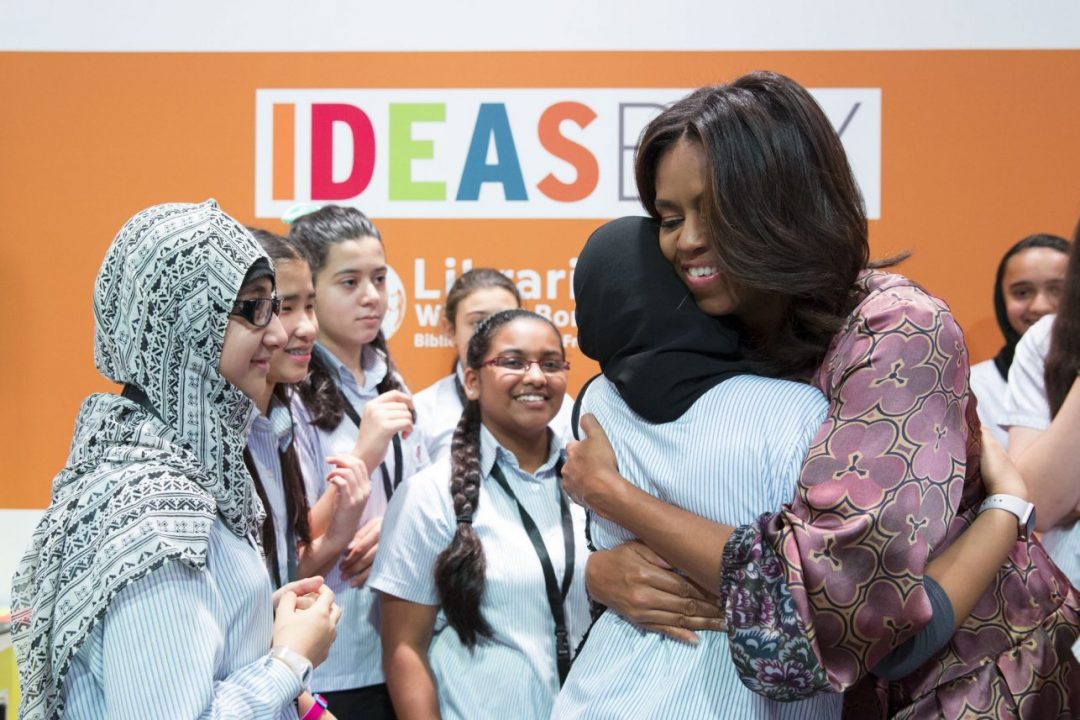DOHA, Qatar — While most Americans were sleeping, first lady Michelle Obama on Wednesday delivered a major speech on girls’ education, urging world leaders not to separate issues of education from wider discussions about girls’ and women’s rights.”If we truly want to get girls into our classrooms, then we need to have an honest conversation about how we view and treat women in our societies,” she told an international education conference. “And this conversation needs to happen in every country on this planet, including my own.”
Obama is in the Mideast this week — she and comedian Conan O’Brien on Tuesday visited American soldiers at nearby Al-Udeid Air Force Base. She also plans to visit Jordan. On Wednesday, she detailed her “Let Girls Learn” campaign, which focuses on adolescent girls’ education.
Speaking early Wednesday at the 2015 World Innovation Summit for Education — as she took the stage, it was about 1:30 a.m. in Washington, D.C. — Obama said 62 million girls worldwide are not in school. While every developed region has achieved or is close to achieving gender parity in primary education, girls still lag far behind in secondary education.
When they attend high school, Obama said, they do so at great risk, as with the more than 200 Nigerian schoolgirls kidnapped by Boko Haram terrorists last year — or as with Malala Yousafzai, the Pakistani teen who was shot in 2009 for advocating for girls’ education. Yousafzai last year became the youngest co-recipient ever of theNobel Peace Prize.
Obama noted, “I don’t think it’s an accident” that girls who want to attend secondary school are threatened. When girls are young, she said, “they are often seen simply as children. But when they hit adolescence and they start to develop into women and are suddenly subject to all of their society’s biases around gender, that is precisely when they start to fall behind in their education.”
So addressing girls’ education is not just about funding more schools, she said, but also about changing attitudes and beliefs. “It’s about whether parents think their daughters are as worthy of an education as their sons. It’s about whether our societies cling to outdated laws and traditions that oppress and exclude women, or whether their views of women are as full citizens entitled to equal rights.”
Once they’ve earned a college degree, she said, women need help joining the workforce “because that’s how we’ll persuade parents that education is a better investment than forcing their daughters into early marriage or forcing them into household labor.”
Obama said the USA has undergone “a long and difficult struggle for women’s equality” that’s ongoing. She noted that 50 years ago, Harvard University’s law school enrolled so few women that professors held a “ladies’ day,” the one day a year in which they called on women in their classes. Now the law school’s president is a woman, she said.
“Back when I was a girl, even though I was bright and curious and I had plenty of opinions of my own, people were often more interested in hearing what my brother had to say,” Obama said. “I was even told that I would never be admitted to a prestigious university, so I shouldn’t even try. Like so many girls across the globe, I got the message I shouldn’t take up too much space in this world, that I should speak up softly and rarely, that I should have modest ambitions for my future, that I should do what I was told and not ask too many questions.”
Obama said she was lucky because she had parents “who believed in me, who had big dreams for me. They told me, ‘Don’t ever listen to those who doubt you.’ They said, ‘Just work harder to prove them wrong.’ And that’s what I did.”
